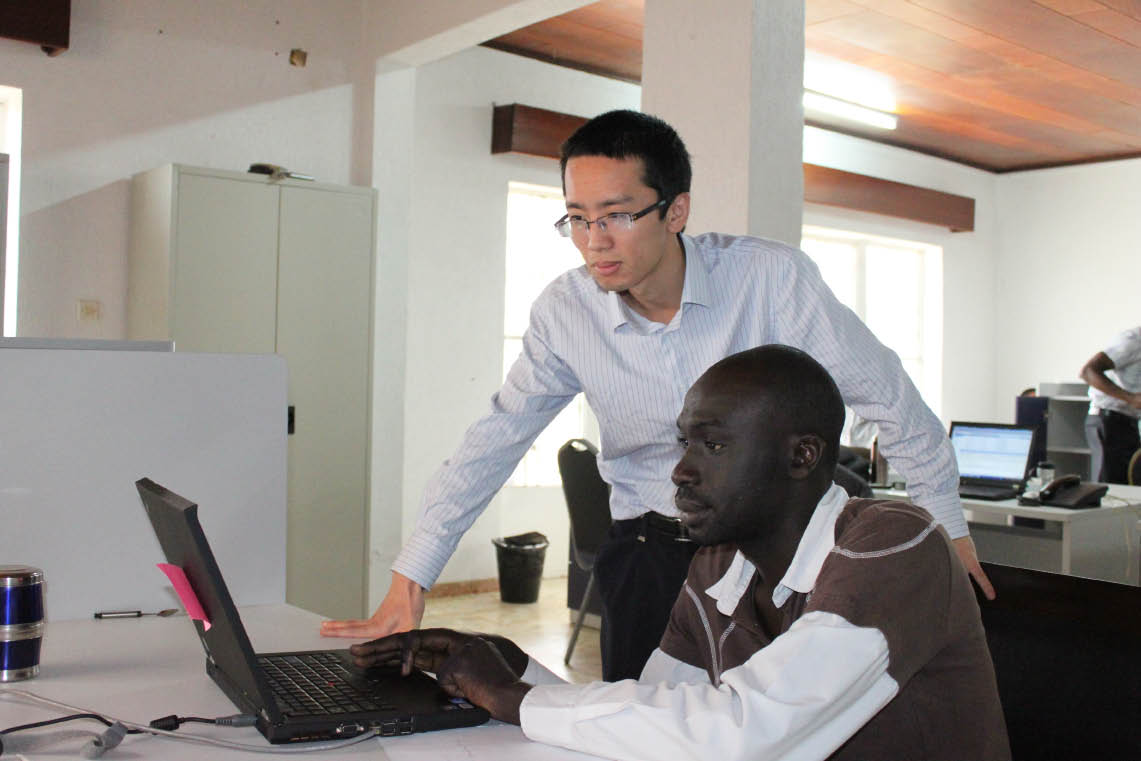| Huawei Repays Its African Community
In 2010 there were 18 Chinese companies operating in Cameroon, and the trade volume between the two countries was over US $1 billion. In August 2011, I visited the Cameroon branch of Huawei Technologies Co., Ltd., a major equipment supplier for Cameroon's telecommunication market, to learn about its success, contributions to local development, and integration into local society.
By staff reporter YAN WEIJUAN
|
 |
| A Chinese engineer with his local coworker at Huawei Cameroon. |
IN a college in Yaoundé, a bespectacled young Chinese is interviewing applicants. This is Shi Weiliang, general manager of Huawei's Cameroon branch. At 29, Shi is not much older than the college graduates he is interviewing, but gives off a strong sense of leadership. He and his team have accomplished many milestones in this African country.
Established in 1988 in Shenzhen, China, Huawei is a private technology company that manufactures telecommunications equipment that provides maintanance services and solutions in the field. In 2009 Huawei's sales volume reached US $21.82 billion, and it became the second private Chinese technology company, and currently the only unlisted company in the Fortune Global 500 list. As of 2010 the company became the world's second largest telecommunications equipment supplier, second only to Sweden's Ericsson.
Since it entered Cameroon in 2005, Huawei has become the dominant equipment supplier for the country's telecommunications market. Last year, its contract value in Cameroon topped US $100 million. Huawei collaborates with several telecommunication service providers, such as Cameroon Telecom, Orange and MTN, on a variety of products. David Nkoto Emane, president of Cameroon Telecom, spoke highly of their relationship with Huawei, saying Huawei had brought advanced technologies into the country. The two companies have worked together to introduce the CT phone service, which allows mobile phone connections all over Cameroon.
The Winning Power of Quality Service
Shi Weiliang entered Tongji University in 2000. After studying two years for an MBA, he went to Rennes International School of Business in France via a student exchange program. He joined Huawei in 2006 after returning to China, and soon headed for Africa. Over five years, he and his 150-strong team, whose average age is only 30, have developed Huawei into the top equipment supplier in Cameroon.
"We owe our success to several factors," explains Shi Wei-liang. "First of all, the Chinese government's support of technology companies has created valuable opportunities for us. In the past, when people mentioned China, shoes and clothes were first things that came to a foreigner's mind. Thanks to favorable policies the government has introduced for the high-tech industry, companies like Huawei are growing rapidly."
"But government support alone is not enough to bring success. Good service plays a vital role in the development of a technology company," said Shi. Although there is strong competition in West Africa from companies like Ericsson and Alcatel, Huawei occupies a large market share. "The main reason is that we are customer-oriented, have a better understanding of what local customers want, and react more quickly to that," he explained. Back in 2008, a customer in Cote d'Ivoire needed urgent help on a weekend. At first he called Ericsson, and was told he had to wait until the following Monday because the relevant manager was on vacation. When the customer tried calling Huawei instead, the company immediately sent out engineers to the site and solved his problems. Since then he has become a loyal client of Huawei.
At the Huawei Cameroon branch, formal working hours start at 8 a.m. and end at 6 p.m., with a two-hour break at noon. However, Shi and his Chinese colleagues have formed a routine of having a summary meeting at 7 p.m. every day. "There are only 24 hours in the day. If we don't work harder, we cannot keep ahead of our competitors. We do many things that other companies can't. For example, our engineers do fieldwork when their rivals in other companies are drinking coffee leisurely; we go into desert areas to install equipment using cattle to transport it under the scorching sun; a 30-year-old female employee of our Cote d'Ivoire office even took an armored vehicle and braved pockets of armed conflict to fix one customer's equipment. We win clients' trust with our dedicated service."
|
